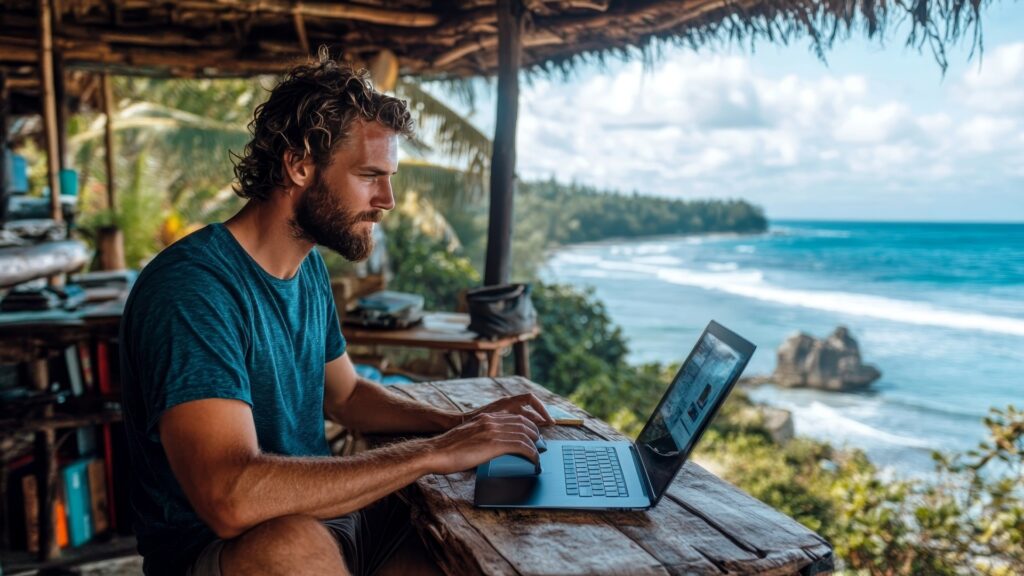For the travel industry, digital marketing for the travel industry isn’t just an option—it’s essential. Digital marketing services encompass various aspects like web design, SEO, and eCommerce marketing, providing a comprehensive approach to enhance the effectiveness of PPC efforts and improve user engagement. Travelers turn to online resources to plan and book their trips, making a strong digital marketing strategy crucial. This article covers the key digital marketing strategies for the travel industry, including SEO, PPC, social media, and content marketing. Get practical tips to help your travel business succeed online.
Key Takeaways
- Digital marketing is essential for travel businesses; it’s the magic wand that turns wanderlust into bookings!
- Embrace Generative Engine Optimization (GEO) – AI-driven content is the new wave of travel marketing; if you’re not on the AI train, you might miss your stop!
- PPC ads are your best buddy for quick leads; just remember, you pay for clicks, not impressions—so spend wisely!
Understanding Digital Marketing for Travel Businesses

In the dynamic world of tourism business, harnessing digital marketing has become indispensable. By interacting with potential clients across various online platforms, one can significantly improve their presence and influence travelers’ booking choices. Imagine your travel business thriving on the internet as it effortlessly navigates a traveler from an initial desire to explore to securing their ideal vacation rental—that epitomizes the effectiveness of internet marketing.
In the tourism industry, digital marketing strategies are crucial to enhance visibility and engagement.
Digital engagement goes beyond enhancing brand recognition. It actively propels travelers through their planning stages. Whether through targeted vacation rental advertising or well-designed marketing messages, adopting a tactical digital stance is crucial for distinguishing your vacation rental property in a saturated market.
Implementing an adept digital marketing strategy holds the power to revolutionize any player within the travel industry, from burgeoning agencies to established entities in tourism.
Essential Components of a Successful Digital Marketing Plan
Crafting an effective digital marketing strategy demands a tailored, agile approach that engages travelers precisely when their interest is piqued. The intricate purchasing journey for those in the travel sector calls for strategies that are both adaptive and timely. This involves implementing local SEO to boost visibility within local search results and employing structured data to secure rich snippets on search result pages, which can enhance click-through rates and overall visibility.
Conducting a comprehensive technical SEO audit is critical to ensure every page is indexed correctly because any page not indexed will fail to attract organic traffic. PPC advertising serves as an efficient method of lead generation since it has the financial benefit of charging solely based on clicks rather than impressions. Effective keyword research can identify high-performing, long-tail keywords that match user intent, leading to more credible leads and improved conversion rates.
Given the superior click-through rates associated with PPC ads specific to the travel industry, this form of advertising should be given due consideration within your marketing tactics. Additionally, the use of negative keywords can filter out irrelevant traffic, thereby improving the effectiveness of PPC campaigns and ensuring that ad groups are more targeted towards high-performing search terms.
Leveraging GEO for Organic Traffic Growth

SEO is fundamental in generating organic traffic for your travel and tourism website, as it increases the site’s visibility, thereby drawing in qualified leads which boosts revenue through search engines.
However, relying solely on organic search results might not be enough to effectively reach your target audience. PPC advertising can complement organic efforts by allowing for targeted visibility and real-time performance tracking, ultimately enhancing the chances of attracting potential guests.
By 2025, traditional SEO will evolve into Generative Engine Optimization (GEO), utilizing AI-driven platforms such as ChatGPT and Google Gemini to guarantee that your content consistently captures attention.
Generating Leads with GEO
The travel industry is increasingly recognizing the importance of Generative Engine Optimization (GEO) due to the rise of AI-driven platforms such as ChatGPT, Perplexity, and Claude that are becoming prominent for giving travel advice. As we look toward 2025, it becomes essential to optimize for GEO in order to be seen.
By offering personalized and engaging conversational replies that travelers find reliable, these technologies play a vital role in producing more qualified leads.
1. Focus on Conversational, Human-Centric Content
Content focusing on travel should emphasize ease of connection and accessibility, striking a chord with the audience’s emotional journey and lived experiences. Engaging consumers becomes more effective when utilizing conversational language that reflects real-life conversation, catering to likely inquiries made to AI tools like “What are the best family-friendly resorts in Florida?”.
By directly tackling travelers’ queries, content enhances user experience and fosters confidence. Incorporating personal narratives and testimonials from fellow travelers can significantly strengthen the impact of your marketing messages.
The inclusion of content created by users themselves heightens both authenticity and approachability within travel marketing.
2. Optimize for User Intent and Long-Tail Queries
Targeting long-tail, intent-driven keywords and question-based phrases, such as “best time to visit Santorini for couples,” can significantly improve your SEO efforts. These relevant keywords cater to specific traveler interests or needs, resulting in higher engagement and conversion rates compared to broader terms, aligning with search intent and search volume.
By structuring content around FAQs and travel scenarios, you can attract more targeted traffic and drive traffic while ensuring precise targeting.
3. Provide Structured, AI-Friendly Content
To stay ahead in 2025, it’s crucial to provide structured, AI-friendly content. Using clear headings, bullet points, and concise paragraphs makes your content easy for AI to parse and summarize.
Schema markup and structured data help AI tools understand your offerings, location, amenities, and unique selling points, leading to increased click-through rates and better search engine results.
4. Showcase Expertise, Trust, and Authority
Establishing credibility and authority is crucial. Showcase your brand’s proficiency by providing comprehensive manuals, regional knowledge, and the most recent updates. To enhance trust in AI-generated replies and to make certain that you attract quality leads as well as more qualified leads, include indicators of confidence like accolades, credentials, consumer testimonials, and protocols for safety.
5. Keep Content Fresh and Relevant
Regularly updating content with the latest deals, seasonal packages, and travel advisories is vital, as AI tools prioritize recent and relevant information.
Featuring a unique selling proposition, unique experiences, local partnerships, and timely events can make your content stand out in generative answers, keeping your audience engaged and informed.
6. Leverage AI-Driven Analytics and Predictive Tools
Platforms that leverage artificial intelligence, such as Google Analytics 4 and SEMrush AI insights, are crucial for monitoring performance metrics and pinpointing emerging trends in dialogue. Utilizing predictive SEO methodologies can forecast changes in traveler inclinations, empowering you to tailor your content approach to maintain both a competitive edge and relevance.
7. Build a Diverse, Authoritative Online Presence
Creating a strong online presence is essential, especially considering that around 65% of travel purchases happen on the internet. A landing page that’s easy to navigate and loads quickly can markedly improve the user experience while also decreasing the likelihood of visitors leaving prematurely.
By implementing SEO tactics on your website, you’re able to boost its position in search engine rankings. This enhancement leads to greater visibility and draws a higher number of organic searches toward your site.
8. Encourage and Feature User-Generated Content
User-generated content (UGC) is a powerful tool for building trust and credibility. Showcasing authentic guest reviews, testimonials, and user-submitted photos or stories enhances engagement and brand visibility.
Incentives like contests or campaigns motivate travelers to share their experiences, adding authenticity to your marketing efforts.
Why GEO Matters Now
The use of AI-driven search and conversational tools has become increasingly popular among travelers for trip planning, with a staggering 70% already utilizing AI in their preparations. GEO encompasses more than simply achieving high rankings on Google. It involves being part of the streamlined, dialogic responses that garner traveler confidence and spur them into action. This shift underscores a notable change in the decision-making process of travelers who now lean towards immediate, AI-curated replies rather than relying on older search techniques.
Incorporating artificial intelligence into the realm of travel research marks a crucial paradigm shift in how individuals scout out and choose where to stay. Hotels failing to adapt to this new wave by optimizing for AI-centric searches stand at risk of losing prospective guests who may opt for other establishments that have better adapted and are more prominent within these novel searching platforms.
To remain relevant amidst rapid digital advances, employing GEO strategies can markedly boost content visibility aiding hotels in standing out from the crowd—thereby retaining competitiveness as consumer behaviors evolve towards these tech-savvy models.
Effective PPC Campaigns for Travel Businesses

PPC campaigns serve as a robust tool for drawing in specialized website traffic and bolstering brand recognition, which is crucial for entities within the travel sector. The distinct advantage of a PPC campaign lies in its cost structure—advertisers pay a fee whenever their ad is clicked, not when they merely view them. This pricing model enables efficient expenditure management and ensures that funds are directed towards actual engagement. For vacation rentals and businesses catering to tourists, PPC initiatives have the potential to garner highly interested leads who are more inclined to make bookings, thus amplifying revenue possibilities.
Pay per click advertising offers dynamic budget control where you’re able to modify your expenditure according to campaign outcomes or financial constraints at any given time. By meticulously researching search patterns and pinpointing the right keywords, advertisers can fine-tune their bid amounts ensuring economical yet impactful exposure aimed precisely at the right audience using well-crafted PPC strategies. Managing and optimizing the ad budget is crucial for maximizing the effectiveness of these campaigns.
Using Google Ads to create ads specifically for vacation rental businesses can significantly enhance targeting and reach.
Engaging with a proficient PPC agency allows for seamless integration of expert PPC management alongside current property tools designed for managing rental properties. Such collaborations broaden your reach among potential customers while providing fresh insights into ad performance metrics which contribute significantly towards refining overall campaign effectiveness. Setting a maximum budget for your PPC campaigns allows for better control over advertising expenditures while ensuring adequate investment for desired results. Targeting specific keywords in Google Ads can enhance visibility in search results, effectively reaching users actively seeking vacation rentals in specific locations. PPC visitors often exhibit higher purchasing intent compared to organic visitors, making them high-quality leads likely to convert.
Google Ads
Google is the most popular search engine. Ads provide a powerful tool for businesses aiming to reach their ideal customers by concentrating on distinct keywords that prospects are actively searching for. This platform offers targeting options based on various user demographic factors, like age and income levels, enabling the creation of resonant advertising content with additional features such as ad extensions. It allows for meticulous control over paid advertising efforts through thoughtful allocation of ads and budget management to secure prime positions in search ads.
When you pour resources into Google Ads while focusing on high-intent keywords, you’re setting up your marketing campaigns for improved returns. By doing so, it ensures that your tailored marketing messages are delivered effectively to the precise audience you want to engage with.
Microsoft Ads
Similar to Google Ads, Microsoft Ads—formerly known as Bing Ads—provides analogous targeting and bidding choices but with potentially less competition. This opens up avenues to engage with guests who favor Bing over other search engines. Employing Microsoft. Ads for vacation rental advertising can broaden your audience reach, guaranteeing that your digital marketing efforts and vacation rental website gain exposure among a diverse array of potential travelers across various platforms.
Harnessing Social Media Marketing for Travel Brands

Social platforms have become a fundamental aspect of travel marketing, with a remarkable 89% of travelers looking to these sites for inspiration. Producing captivating content on these networks can greatly enhance customer engagement and increase the visibility of brands in the travel sector. Personalized interactions through social media marketing enable travel companies to connect more profoundly with potential clients.
Identifying and understanding the target audience for social media campaigns is crucial for tailoring content and strategies that resonate with potential guests.
By leveraging both organic strategies and specific paid ads on channels such as Facebook, Instagram, and Google, businesses can achieve notable returns on investment. Considering that approximately 80% of users on social media follow travel influencers for their suggestions, allocating resources into dynamic social media campaigns and forming collaborations with influencers is an effective strategy to stimulate an uptick in bookings.
Facebook and Instagram Ads
Advertisements on social media platforms such as Facebook and Instagram are influential in swaying the booking choices of 41% of travelers, establishing them as effective instruments for travel companies. The ability to craft visually striking ads on these platforms engages potential travelers rapidly by leveraging content rich in visuals to appeal to a wide-ranging audience.
Influencer Partnerships
Working with influencers can greatly increase the level of trust consumers have in a travel brand because these personalities tend to be seen as more relatable compared to conventional advertising methods. The genuine experiences that influencers share often lead to greater interaction and improved conversion rates due to their ability to connect authentically with their audience.
Content created by users, including testimonials and personal travel narratives, fosters a sense of authenticity and strengthens the bond of trust between travel brands and their customers.
Content Marketing Strategies for Travel Agencies

Employing content marketing is a potent approach for travel agencies, yielding conversion rates that are six times higher than those of companies not utilizing this strategy. The art of genuine storytelling establishes an emotional bond with prospective travelers, spurring them on to make bookings. Captivating imagery such as photographs and videos effectively showcase the allure of travel spots and pique curiosity.
The evolution of the travel agency from traditional in-person booking to leveraging digital platforms for planning and booking trips has transformed the industry. A strong online presence and targeted marketing strategies, such as pay-per-click (PPC) campaigns, are crucial for travel agencies to effectively reach and engage prospective customers in the highly competitive online environment.
Integrating content created by users greatly enhances credibility and engenders trust amongst your intended audience. By categorizing potential customers according to their tastes—be it thrill-seeking adventures or indulgent luxury—you can tailor your content creation for maximum impact. Infographics serve as a tool to distill complicated travel data into digestible pieces, fostering ease in comprehension and dissemination.
Drawing inspiration from leading brands in leveraging interactive platforms and gamification strategies can also elevate user engagement levels significantly.
Email Marketing to Drive Bookings

Email marketing is acknowledged as an exceptionally profitable method, yielding a remarkable $42 in return for every dollar invested. By distributing email newsletters filled with engaging narratives, handy advice, and event spotlights, travel agents can ensure their brand remains prominent in the minds of potential clients. Personalized emails that cater to specific customer groups based on their preferred travel experiences are known to significantly boost the likelihood of transactions.
By segmenting their email databases, travel agents have the ability to customize content which results in messages being more pertinent and consequently leading to increased interest from those receiving them. Email campaigns that showcase time-sensitive promotions or unique propositions can invoke a feeling of immediacy, encouraging prospective travelers to make faster decisions.
The application of artificial intelligence technologies for presenting personalized suggestions and materials informed by consumer behavior significantly strengthens your email marketing initiatives’ impact.
Advanced Analytics Tools for Measuring Success
Advanced analytics tools help travel businesses understand customer behaviors and measure campaign effectiveness. Conversion tracking improves landing pages to enhance user engagement and increase conversions.
Metrics like click share and impression share reveal how ads perform relative to competitors, providing valuable insights for optimizing future campaigns.
Choosing the Right Digital Marketing Agency for Travel and Hospitality

Selecting an appropriate digital marketing agency for your travel and hospitality company is essential. Opt for agencies with expertise in your niche to gain a partner that understands the distinctive requirements of your business. Agencies that have received awards can be considered trustworthy, as these honors signify their proficiency in executing successful campaigns. Look for those offering comprehensive services, encompassing branding, content production, paid social media strategies, influencer outreach programs, search engine optimization (SEO), website development, and crisis management capabilities.
Consider working with agencies like Voyage Travel Marketing, which are renowned for their cooperative work style and customization options. They shine when it comes to crafting engaging narratives through creative storytelling and focusing on designs that appeal to humans at the core level. If you aim to attract an international clientele, consider companies such as Socially Powerful or MMGY Global who possess a worldwide presence along with insights into local markets.
By prioritizing these considerations while choosing a digital marketing partner, you will position yourself better to achieve impactful outcomes within the ever-evolving realm of travel industry marketing.
Effective Summer Marketing Strategies for 2025

Initiate your ad campaigns promptly, preferably in May, to seize the attention of vacation planners during the summer travel season. To increase interaction rates with these travelers, incorporate engaging ad copy that embodies summertime motifs and adventures. Propel faster booking decisions by presenting time-sensitive discounts at moments when bookings typically surge.
Increase your presence by getting involved with community events throughout the summer months—this strategy helps foster a connection between your business and local activities. As part of this seasonal shift, rejuvenate both websites and reservation systems to feature special offers for summer while making sure they are optimized for mobile users.
Lastly, tailor marketing materials to suit summery browsing tendencies by creating digestible content such as concise posts, carousel images, and brief videos. All designed to drive higher levels of user engagement during these warmer months.
Summary
In summary, the travel industry can greatly benefit from a well-rounded digital marketing strategy that includes SEO, PPC, social media, content marketing, and email campaigns. By leveraging advanced analytics tools and selecting the right digital marketing agency, travel brands can drive more bookings and enhance their visibility. As we head into 2025, staying ahead with GEO and AI-driven strategies will be key to thriving in the competitive travel market. So implement these strategies and watch your bookings soar!
✈️ Ready to boost bookings and skyrocket your travel business online? Call us at (305) 906-1958 or schedule a free strategy session now.
Frequently Asked Questions
Why is digital marketing essential for travel businesses?
Digital marketing is crucial for travel businesses because it boosts visibility and engages customers right when they’re dreaming about their next getaway.
So, if you’re not online, are you even on vacation?
What are the benefits of using PPC advertising for travel businesses?
PPC advertising is like a travel agent with a golden key—unlocking targeted traffic and qualified leads while letting you choose your own budget.
It’s not just cost-effective; it’s your ticket to reaching more eager adventurers!
How can social media marketing benefit travel brands?
Social media marketing is like a magic wand for travel brands, boosting customer interaction and brand visibility while crafting personalized experiences that potential travelers can’t resist.
So, get ready to turn those dream vacations into booked tickets!
What should you look for when choosing a digital marketing agency for travel and hospitality?
When choosing a digital marketing agency for travel and hospitality, seek out one that has industry experience, a comprehensive range of services, and a knack for collaboration.
Because if they can navigate the globe as well as you do, you’ll be in great hands!
Why is GEO important for travel businesses in 2025?
GEO is crucial for travel businesses in 2025 because it boosts visibility in AI-driven searches that travelers rely on, keeping you ahead in the digital game.
Don’t get left in the dust; embrace the geo-revolution!
